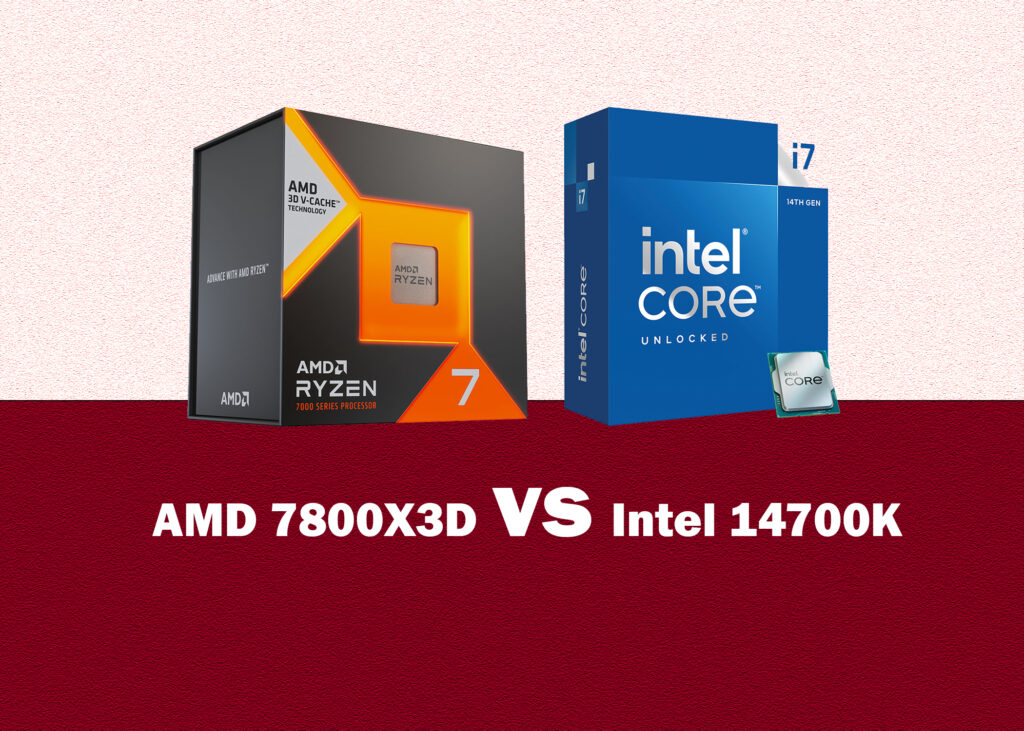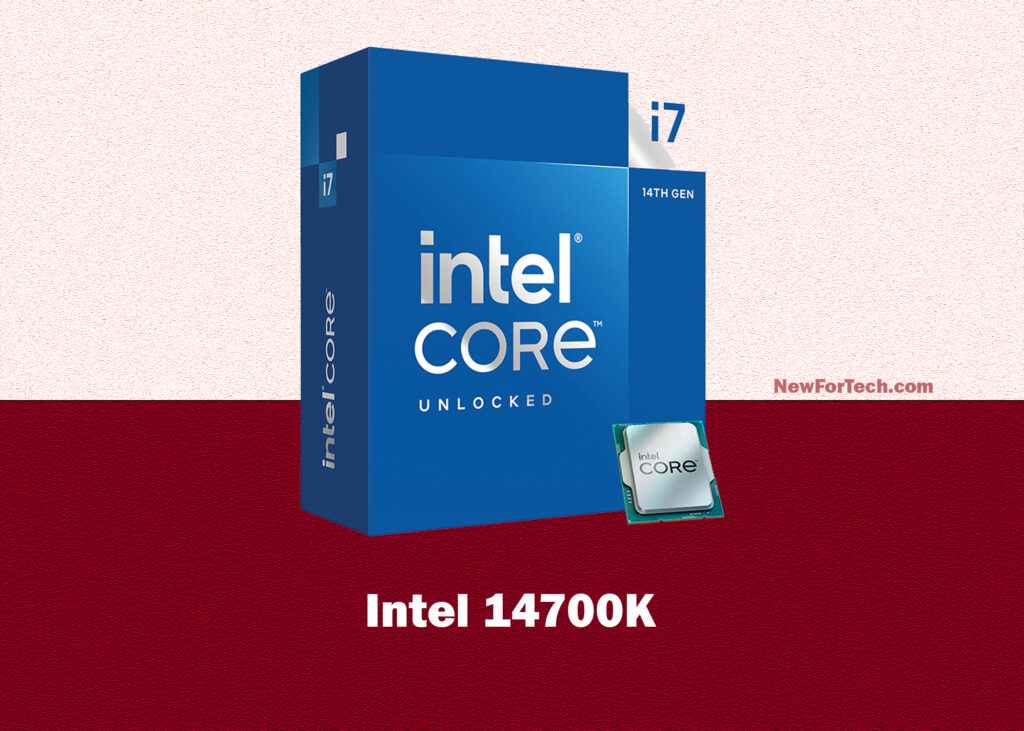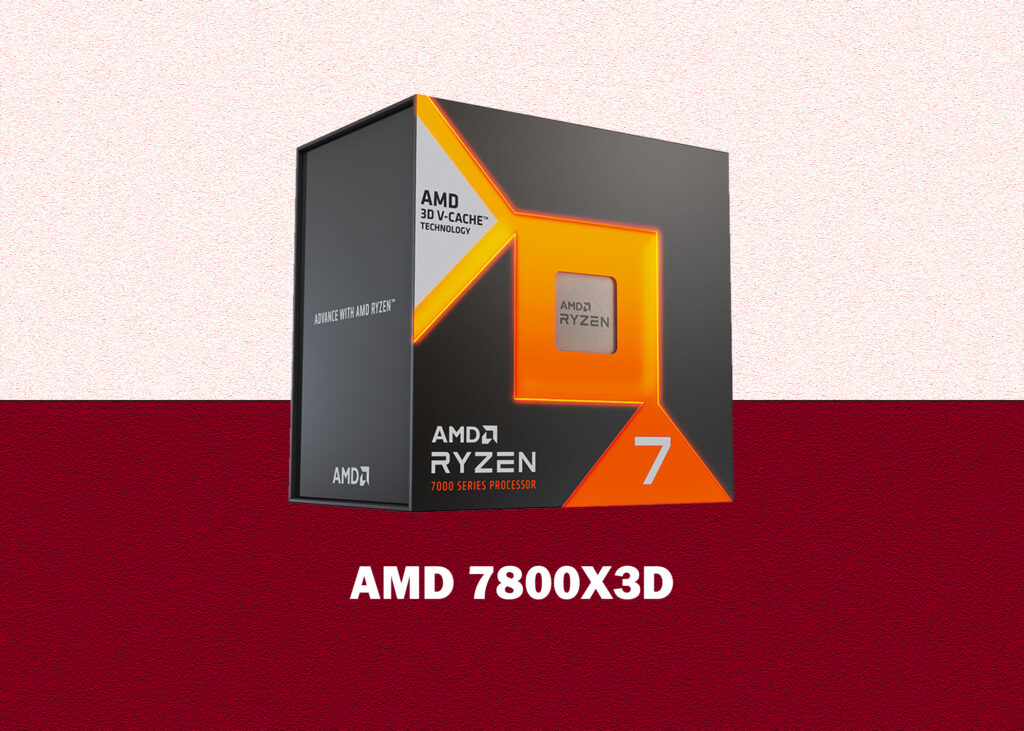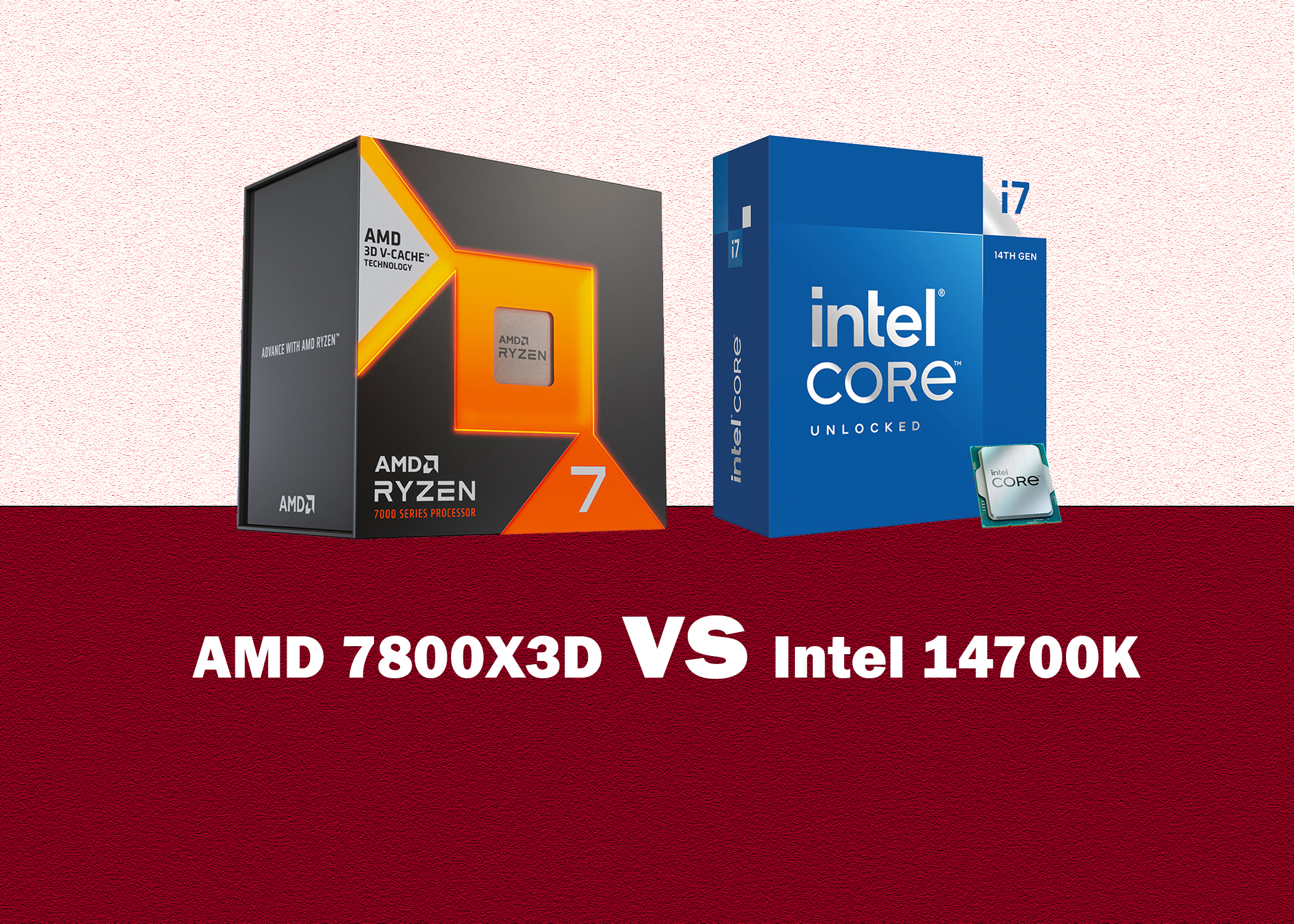Choosing between the Intel Core i7-14700K and the AMD Ryzen 7 7800X3D prompts a crucial decision for midrange gaming enthusiasts. To simplify this comparison, we delve into the key specifications and performance aspects of these processors.

Intel Core i7-14700K
Efficiency Cores: 12
Performance Cores: 8
Threads: 28
Base Clock (E-Cores): 2.5 GHz
Base Clock (P-Cores): 3.4 GHz
Boost Clock (E-Cores): 4.3 GHz
Boost Clock (P-Cores): 5.5 GHz
Total Cache: 61MB
TDP: 125W
The i7-14700K impressively mirrors the performance of the Core i9-13900K at a more budget-friendly i7 price. Despite its commendable gaming prowess, drawbacks include marginal generational improvements, elevated heat levels, and increased power consumption.

Pros:
- Core i9-13900K performance
- Exceptional gaming capabilities
- Slight price reduction compared to the previous generation
Cons:
- Limited gen-on-gen enhancements
- High thermal output
- Increased power usage
AMD Ryzen 7 7800X3D
Performance Cores: 8
Threads: 16
Base Clock: 4.2 GHz
Boost Clock: 5.0 GHz
Cache: 104MB Total
TDP: 120W
The AMD Ryzen 7 7800X3D emerges as a compelling successor to its gaming-focused predecessor, boasting notable energy efficiency and midrange pricing. However, challenges arise in non-gaming performance and the 3D V-Cache’s effectiveness at higher settings.

Pros:
- Outstanding gaming performance
- Highly energy-efficient
- Competitive midrange pricing
Cons:
- Lagging non-gaming performance
- 3D V-Cache less effective at higher settings
To determine the ideal choice for your mid-range gaming rig, we pit the Intel i7-14700K against the AMD Ryzen 7 7800X3D. These processors embody different approaches: Intel’s latest iteration builds upon Raptor Lake, while AMD’s 7800X3D refines its predecessor with 3D V-Cache technology.
In this clash of iteration versus innovation, both chips derive excellence from prior processors. Our comprehensive analysis aims to guide your purchasing decision by unraveling the complexities. Deciding between Intel and AMD is nuanced; continue reading to unveil which brand aligns with your gaming aspirations.
14700K vs. 7800X3D: Price Analysis
In the realm of affordability, both the Intel Core i7-14700K and AMD Ryzen 7 7800X3D position themselves within the mid-range tier of their respective generations.
Intel Core i7-14700K:
Priced at $409 / £311 / AU$593, the 14700K stands as the more economical choice compared to its AMD counterpart.
Notably, the 14700K exhibits a slight price drop, marking a $10 / £7 / AU$15 saving from its predecessor, the i7-13700K, translating to approximately 2%.
Moreover, the cost advantage extends as the 14700K maintains compatibility with the LGA 1700 socket, offering seamless integration with older motherboards after a BIOS update.
AMD Ryzen 7 7800X3D:
In contrast, the Ryzen 7 7800X3D demands a slightly higher price tag of $449 / £341 / AU$651.
Furthermore, the 7800X3D lacks backward compatibility due to its utilization of the AM5 socket, necessitating a board upgrade.
Price Conclusion:
The Intel Core i7-14700K emerges as the cost-effective winner, offering both a lower initial price and the advantage of compatibility with existing motherboards. This price disparity of $40 / £30 / AU$58, approximately 9%, underscores the economical appeal of the 14700K.
14700K vs. 7800X3D: Specs & Features Showdown
In the arena of specifications and features, the Intel Core i7-14700K and AMD Ryzen 7 7800X3D embark on divergent paths in their mid-range offerings.
Hardware Overview:
| Intel Core i7-14700K | AMD Ryzen 7 7800X3D | |
|---|---|---|
| Performance Cores | 8 | 8 |
| Efficiency Cores | 12 | — |
| Threads | 28 | 16 |
| P-Core Base Clock | 3.40GHz | 4.20GHz |
| P-Core Boost Clock | 5.60GHz | 5.00GHz |
| E-Core Base Clock | 2.50GHz | — |
| E-Core Boost Clock | 4.30GHz | — |
| L3 Cache | 33MB | 96MB |
| TDP | 125W | 120W |
| Motherboard Socket | LGA 1700 | AM5 |
Architectural Differences:
Intel’s 14700K relies on the hybrid microarchitecture seen in Alder Lake and refined in Raptor Lake, incorporating both performance and efficiency cores. Conversely, AMD’s 7800X3D adopts the Zen 4 microarchitecture with a 5nm process.
Noteworthy Highlights:
- The 7800X3D boasts a substantial L3 Cache, 3D V-cache, and a faster base clock speed with 8 cores and 16 threads.
- The 14700K, with a total of 20 cores and 28 threads, achieves a remarkable 5.6 GHz boost clock.
Technical Performance Dive:
A deeper exploration into the technical performance will reveal which chip stands atop this mid-range showdown. However, the Intel Core i7-14700K secures victory based on its comprehensive specifications.
14700K vs. 7800X3D: Unveiling Performance Dynamics
When evaluating processors for your gaming rig, performance takes center stage. The i7-14700K, despite its iterative nature, excels where it matters, while the 7800X3D holds its ground in synthetic benchmarks.
Synthetic Benchmarks:
In synthetic tests, the 14700K outshines the 7800X3D, boasting up to a 10% lead, particularly evident in multi-core scenarios.
The Intel Core i7-14700K maintains its dominance across broader synthetic benchmarks and productivity tasks, showcasing its superiority in core count.
Productivity Tasks:
While the 7800X3D shows commendable productivity figures, it falls short of the i7-14700K’s capabilities, with a substantial up to 10% difference.
Gaming Performance:
Surprisingly, the 7800X3D excels in gaming, leveraging its 3D V-cache for a remarkable up to 27% performance boost. For pure gaming enthusiasts, AMD takes the lead.
Power Efficiency:
The AMD Ryzen 7 7800X3D shines in power efficiency, maintaining a cool 84.3℃ at max stress with a 120W TDP. In contrast, the i7-14700K hits 100℃ with a power draw over three times as much.
Performance Verdict:
While the 14700K dominates in productivity, synthetic benchmarks, and creative tasks, the 7800X3D showcases its prowess in gaming performance. The choice hinges on your priority – overall power or a gaming-centric approach.
Winner: Intel Core i7-14700K
14700K vs. 7800X3D: Conclusive Insights
Our comprehensive comparison between the 14700K and 7800X3D provides two distinct paths. Opting for an all-encompassing performer, excelling in gaming and diverse tasks, leads to favoring Intel’s latest offering. This inclination is reinforced by the attractive price point, making the i7 CPU more budget-friendly than its mid-range Ryzen counterpart.
However, if your focus is solely on constructing an elite gaming rig, equipped with the pinnacle graphics card, the 7800X3D steals the spotlight. The 3D V-Cache significantly elevates gaming prowess, surpassing the capabilities of Intel’s hybrid architecture.
Ultimately, the decision hinges on your machine’s intended purpose. Yet, based on our rigorous testing, the Intel Core i7-14700K emerges as the overall winner against the AMD chip. Not only does it boast compatibility with older motherboards, but it also supports DDR4 RAM, offering potential cost savings compared to Team Red’s DDR5-exclusive AM5 processors. Your extra savings could be channeled towards securing a superior GPU.
Final Verdict: Intel Core i7-14700K Triumphs

